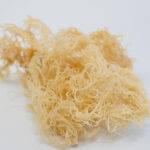Table of Contents
Sea moss, also known as Irish moss, has been gaining popularity as a superfood packed with essential nutrients and health benefits. This red algae, scientifically referred to as Chondrus crispus, has been used for centuries in traditional medicine and culinary practices. Recently, it has become a favorite among health enthusiasts and nutrition experts for its wide range of benefits, from boosting the immune system to supporting digestive health. But what exactly does sea moss do for you? In this article, we will delve into the nutritional profile of sea moss, explore its key health benefits, and examine the best ways to incorporate it into your diet. Additionally, we’ll look at potential risks and side effects to ensure you can enjoy sea moss safely and effectively. Read on to discover how this remarkable sea vegetable can enhance your overall well-being.
Key Health Benefits of Sea Moss
Sea moss, or Irish moss, has garnered attention for its impressive array of health benefits. This nutrient-dense red algae, scientifically known as Chondrus crispus, offers a variety of advantages that can support overall well-being. Here, we explore the key health benefits of incorporating sea moss into your diet.
Boosts Immune System
Sea moss is rich in vitamins and minerals that are crucial for a robust immune system. It contains high levels of vitamin C, vitamin A, and zinc, all of which play vital roles in enhancing immune function. Vitamin C acts as a powerful antioxidant, protecting cells from damage and boosting the production of white blood cells, essential for fighting infections. Vitamin A supports the immune system by maintaining the health of skin and mucous membranes, while zinc helps in the development and function of immune cells.
Supports Digestive Health
One of the standout benefits of sea moss is its positive impact on digestive health. Sea moss is high in dietary fiber, which aids in digestion by adding bulk to the stool and promoting regular bowel movements. Its mucilaginous texture soothes the digestive tract, helping to relieve conditions such as gastritis and indigestion. Additionally, sea moss acts as a prebiotic, fostering a healthy gut microbiome by providing food for beneficial gut bacteria.
Promotes Thyroid Function
Sea moss is a natural source of iodine, an essential mineral for thyroid health. The thyroid gland uses iodine to produce hormones that regulate metabolism, energy levels, and overall hormonal balance. Adequate iodine intake is crucial for preventing thyroid disorders such as hypothyroidism and goiter. Sea moss provides a natural and bioavailable form of iodine, making it an excellent addition to a diet aimed at supporting thyroid function.
Enhances Skin Health
The high sulfur content in sea moss gives it potent antibacterial and anti-inflammatory properties, which can improve various skin conditions. Regular use of sea moss, either topically or as part of your diet, can help treat acne, eczema, and psoriasis. Its rich mineral content, including magnesium, calcium, and vitamins K and E, supports skin hydration, elasticity, and overall health, promoting a glowing complexion.
Aids in Weight Management
Sea moss can be a valuable ally in weight management efforts. The high fiber content in sea moss helps you feel fuller for longer, reducing overall calorie intake. Its ability to support thyroid function also plays a role in maintaining a healthy metabolism. Additionally, sea moss provides a low-calorie, nutrient-dense option that can be easily incorporated into various dishes, helping you stay on track with your dietary goals.
Supports Joint and Muscle Health
The anti-inflammatory properties of sea moss extend to joint and muscle health. Sea moss contains compounds like omega-3 fatty acids and potassium chloride, which help reduce inflammation and soothe joint pain. Athletes and active individuals can benefit from sea moss’s ability to aid in muscle recovery and reduce post-exercise soreness.
How Sea Moss Supports Your Immune System
Sea moss is renowned for its ability to bolster the immune system due to its rich nutritional profile. Packed with essential vitamins, minerals, and antioxidants, sea moss provides key nutrients that are crucial for immune function.
Vitamin C and Antioxidants
One of the primary ways sea moss supports the immune system is through its high content of vitamin C and antioxidants. Vitamin C is a potent antioxidant that helps protect cells from damage caused by free radicals, which are harmful molecules that can weaken the immune system. By boosting antioxidant defenses, sea moss helps the body fight off infections and maintain overall health.
Vitamin A
Sea moss is also a good source of vitamin A, which plays a critical role in supporting immune function. Vitamin A is essential for maintaining the health of the skin and mucous membranes, which act as barriers to pathogens entering the body. By supporting the integrity of these barriers, vitamin A helps prevent infections and promotes immune response.
Zinc
Zinc is another essential nutrient found in sea moss that supports immune function. Zinc is involved in numerous cellular processes, including the development and function of immune cells. It helps regulate immune responses and contributes to the body’s ability to fight off infections. Adequate zinc intake is crucial for optimal immune function, and sea moss provides a natural source of this important mineral.
Anti-inflammatory Properties
In addition to its immune-boosting vitamins and minerals, sea moss possesses anti-inflammatory properties that can benefit immune health. Chronic inflammation can impair immune function and increase susceptibility to infections. Sea moss contains compounds like omega-3 fatty acids and various antioxidants that help reduce inflammation, promoting a healthier immune response.
Incorporating sea moss into your diet can help fortify your immune system by providing essential nutrients and supporting overall immune function. Whether consumed as a gel, powder, or added to foods and beverages, sea moss offers a natural and effective way to enhance your body’s defenses against illness and infection.
Sea Moss and Digestive Health: A Closer Look
Sea moss, also known as Irish moss or Chondrus crispus, offers significant benefits for digestive health, making it a valuable addition to your diet. This red algae is rich in dietary fiber, which plays a crucial role in supporting gastrointestinal function and promoting overall digestive wellness.
High Fiber Content
One of the primary reasons sea moss supports digestive health is its high fiber content. Fiber is essential for maintaining regular bowel movements and preventing constipation. Sea moss contains both soluble and insoluble fiber, which work together to add bulk to stool and facilitate its passage through the digestive tract. This promotes healthy digestion and reduces the likelihood of digestive issues.
Prebiotic Properties
Sea moss exhibits prebiotic properties, meaning it serves as a food source for beneficial bacteria in the gut. These bacteria, known as probiotics, play a vital role in maintaining gut health and supporting a balanced microbiome. By promoting the growth of probiotics, sea moss helps enhance digestive function and may improve nutrient absorption from food.
Soothing Mucilaginous Texture
The mucilaginous nature of sea moss contributes to its soothing effect on the digestive tract. When prepared into a gel-like consistency, sea moss forms a mucilage that coats the lining of the stomach and intestines. This protective barrier can help alleviate inflammation and irritation, making it beneficial for individuals with conditions like gastritis or acid reflux.
How to Prepare Sea Moss
Preparing sea moss is straightforward and involves a few simple steps:
Rinse: Start by thoroughly rinsing dried sea moss to remove any debris or salt.
Soak: Place the sea moss in a bowl of water and let it soak for 12-24 hours. This hydrates the sea moss and allows it to expand.
Blend: After soaking, drain and rinse the sea moss again. Then, blend it with fresh water until smooth to create a gel-like consistency.
Store: Store the prepared sea moss gel in a glass container in the refrigerator for up to two weeks. Use as needed by adding it to smoothies, soups, sauces, or consuming it directly.
Does Sea Moss Make You Horny?
Anecdotal evidence suggests that sea moss may have aphrodisiac effects and could potentially enhance libido. While scientific research specifically on sea moss’s effects on sexual desire is limited, its rich nutrient profile, including vitamins and minerals like zinc, may indirectly support reproductive health and vitality.
Incorporating sea moss into your diet can contribute to improved digestive health and overall well-being. Whether consumed as a gel or added to various recipes, sea moss offers a natural and effective way to support digestive function and promote a healthy gut microbiome.
Potential Risks and Side Effects of Sea Moss
While sea moss offers numerous health benefits, it’s essential to be aware of potential risks and side effects associated with its consumption.
Iodine Overconsumption
Sea moss is exceptionally rich in iodine, which is essential for thyroid function. However, excessive iodine intake can lead to thyroid dysfunction, such as hyperthyroidism or iodine toxicity. It’s crucial to moderate your intake and consult with a healthcare professional, especially if you have existing thyroid issues or are taking medications affecting thyroid function.
Heavy Metal Contamination
Sea moss, like other seaweeds, can absorb heavy metals and toxins from its environment. Contaminants such as arsenic, lead, and cadmium may accumulate in sea moss, particularly if sourced from polluted waters. To mitigate this risk, ensure you purchase sea moss from reputable suppliers who conduct thorough testing for contaminants.
Allergic Reactions
Some individuals may be allergic to sea moss or other types of seaweed. Symptoms of an allergic reaction can include itching, swelling, rash, or difficulty breathing. If you experience any allergic symptoms after consuming sea moss, discontinue use and seek medical attention promptly.
Unpleasant Taste and Texture
Sea moss, especially in its raw form, may have a strong oceanic taste and a gelatinous texture that some people find unappealing. This can make it challenging to incorporate into daily meals or beverages. Choosing flavored sea moss products or blending it into smoothies can help mask its taste while still reaping its nutritional benefits.
conclusion
sea moss is a versatile superfood with a myriad of benefits that can enhance overall health and well-being. From supporting immune function and promoting digestive health to providing essential nutrients like iodine and antioxidants, sea moss offers a natural way to bolster your body’s defenses and improve various bodily functions.
However, it’s crucial to approach sea moss consumption with awareness of potential risks, such as iodine overconsumption and heavy metal contamination. By sourcing sea moss from reputable suppliers and moderating intake, you can enjoy its benefits safely.
Whether consumed as a gel, powder, or incorporated into recipes, sea moss provides a nutrient-dense addition to your diet. Its ability to support skin health, aid in weight management, and potentially enhance libido makes it a valuable supplement for overall vitality. Incorporate sea moss mindfully into your wellness routine to experience its full range of health-promoting effects.







